title="Return to Table of Contents">Oberlin Alumni Magazine
Spring 2013 Vol. 108 No. 2
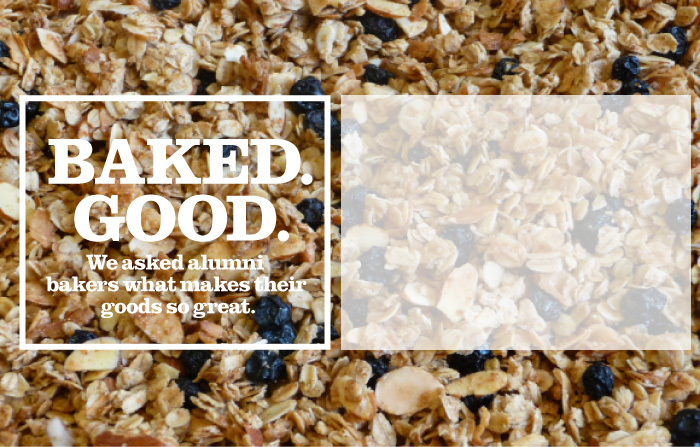
There's something miraculous about what bakers do with a few good ingredients and
the heat of an oven. We asked a few of our alumni miracle workers what makes their
baked goods so heavenly.
What's special about Mark Furstenberg's bread is the history behind it. Not just Furstenberg's own story (as an idealistic 1960 graduate, he was so inspired by JFK that he traveled to D.C. to ask what he could do for his country), but the history of the bread itself. His traditional bread comes from a starter (or levain or sour) that Furstenberg made in 1989—before most Oberlin students were even born. "My bread is not fancy. It is not filled with unusual ingredients—no sun-dried tomatoes, no sugar, no cheese. It is bread made in a very traditional way, shaped by hand."
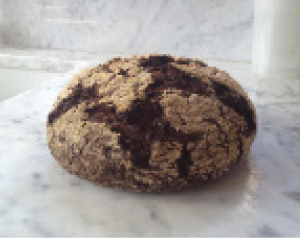 Furstenberg's historic bread
Furstenberg's historic breadBut Furstenberg's path into the baking business was anything but traditional. He spent a year in television in D.C., then worked at the White House on what would become President Johnson's War on Poverty.
"People like me expected to spend our lives in public service," he says. "But our views of politics became contaminated, first by the Vietnam War, then by the Nixon administration. The Reagan years washed us up." In 1990, at age 52 and after working in local government, the non-profit sector, and then joylessly writing for the Washington Post, he made a drastic change—opening one of the city's first artisanal bread shops, Marvelous Market. Breadline followed three years later. In 1995, he developed the baking program for the Culinary Institute of America in California's Napa Valley.
Furstenberg was brought up in a family that ate breakfast and dinner together and cherished food made from scratch, an ethic he feels is important to preserve. "The great meanings of food—eating together, family, friends, food as part of life—have given way to a celebrity: food as performance, as competition, as satisfying the egos of chefs who think they are celebrities," he says. Despite his approach, he is now something of a D.C. celebrity himself; the Washington Post referred to him as the "renowned Washington baker" and showcased his home kitchen makeover.
Mark Furstenberg was brought up in a family that ate breakfast and dinner together and cherished food made from scratch, an ethic he feels is important to preserve.
These days Furstenberg teaches baking, consults with restaurants and other businesses, and is writing a book. Within a year he plans to open a new neighborhood bakery that will sell traditional bread—particularly whole grain breads—and American desserts. It will be called Bread Furst.
Ask cleveland pastry chef diana dumitru '90 to reveal her celebrity clients, and she'll name chef Paula Deen, NBA star LeBron James, singer Gloria Estefan, and the Oberlin Alumni Magazine (she baked a cover-replica cake to celebrate 100 years of publishing). But she specializes in fulfilling special—and often odd—requests, such as the bride-to-be's "Can you make an upside-down cake?" (The bride's sister just put in her own order: a tiered cake covered in edible silver leaf.) Dumitru's cookies will be included in the box lunches at this year's commencement exercises.
Quinoa, puffed millet, fennel, and fenugreek don't sound like the basic ingredients for granola, but for baker Claire Fitts '02 they came together so well—along with coconut, coconut oil, Vermont maple syrup, pumpkin seeds, cardamom, nutmeg, Tahitian vanilla, and gluten-free oats—that the combo earned the name Mighty Tasty Granola.
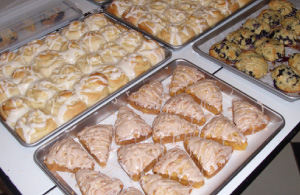 Hamburgh's "secret" scones and buns
Hamburgh's "secret" scones and bunsAs a student at Oberlin, Beth Kontrabecki Walters '00 baked cookies at the Cat in the Cream coffeehouse (she still has the top-secret recipe), but without formal training, she never imagined baking professionally. But last summer she took a batch of baked goods to a local farmers' market and was stunned when everything sold out. Thus was born Hamburgh Confectionery (using the old spelling of the New York town's name). Walters' specialties include pumpkin spice scones—perennial sellouts available in September and October only—and citrus buns, a cinnamon bun flavored with orange zest and glazed with a frosting from yet another top-secret recipe.
For Jacqueline O'Kelly '10, who founded Golden Girl Granola as a student five years ago, it's not what's in her granola that makes it special—it's what it represents. She does use locally sourced ingredients like honey and pure organic maple syrup in her seven granola varieties (including the gluten-free Truly Tropical) sold in stores—including Whole Foods—around her Carlisle, Massachusetts, hometown. But the Golden Girl idea, epitomized by the cheerful imp on the packages, conveys for O'Kelly "an image of a youthful person enjoying eating something absolutely delicious—head-over-heels delicious."
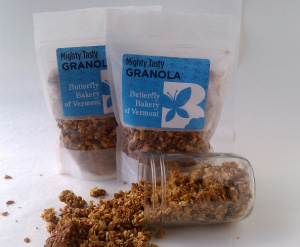 Butterfly's go-with-the-grains granola
Butterfly's go-with-the-grains granolaThe specialty of Rubicon Bakery, the Richmond, California, commercial bakery owned by Andrew Stoloff '83, isn't the cakes, tarts, or other confections produced for stores in Northern California, Oregon, and Washington—it's giving second chances. "We hire recent former drug addicts, homeless people, and folks being released from prison," Stoloff says of his 20-year-old socially minded enterprise. It's a spinoff from Rubicon Programs, a nonprofit social-service organization. Stoloff, who also owns the Red Tractor Café in Dublin, California, bought the bakery in 2009 and invested in new equipment that allowed for more customers and eventually more employees—from about 12 to 85. A cut of the bakery's profits—70 grand over the last two years—is given back to Rubicon Programs. Of course, when most customers eat Rubicon goods, they're thinking of second helpings, not second chances.
What makes the sourdough whole-grain breads and pizza at Muddy Fork Bakery so good is not just what goes into them—Indiana-grown wheat and rye freshly ground for each bake—but what they go into. The Bloomington-based artisanal bakery specializes in baked goods made by hand in a brick, wood-fired oven on the south-central Indiana farm of bakery owners Katie Zukof '03 and Eric Schedler '02. Muddy Fork's flour, honey, and eggs are locally grown and raised, as are cheeses, meats, and vegetables for the pizzas, and fruit for the scones, parfaits, and shortcakes. Muddy Fork sells year-round at farmers' markets, the local grocery co-op, and several restaurants. It also offers a subscription service, delivering produce, pizza, granola, and bread still warm from the oven.
As a student at Oberlin, Beth Kontrabecki Walters '00 baked cookies at the Cat in the Cream coffeehouse (she still has the top-secret recipe), but without formal training, she never imagined baking professionally. But last summer she took a batch of baked goods to a local farmers' market and was stunned when everything sold out. Thus was born Hamburgh Confectionery (using the old spelling of the New York town's name). Walters' specialties include pumpkin spice scones—perennial sellouts available in September and October only—and citrus buns, a cinnamon bun flavored with orange zest and glazed with a frosting from yet another top-secret recipe.
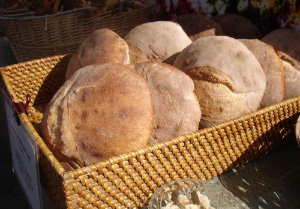 Muddy Fork's wood-
fired wheat and rye
Muddy Fork's wood-
fired wheat and ryeFor Jacqueline O'Kelly '10, who founded Golden Girl Granola as a student five years ago, it's not what's in her granola that makes it special—it's what it represents. She does use locally sourced ingredients like honey and pure organic maple syrup in her seven granola varieties (including the gluten-free Truly Tropical) sold in stores—including Whole Foods—around her Carlisle, Massachusetts, hometown. But the Golden Girl idea, epitomized by the cheerful imp on the packages, conveys for O'Kelly "an image of a youthful person enjoying eating something absolutely delicious—head-over-heels delicious."
The specialty of Rubicon Bakery, the Richmond, California, commercial bakery owned by Andrew Stoloff '83, isn't the cakes, tarts, or other confections produced for stores in Northern California, Oregon, and Washington—it's giving second chances. "We hire recent former drug addicts, homeless people, and folks being released from prison," Stoloff says of his 20-year-old socially minded enterprise. It's a spinoff from Rubicon Programs, a nonprofit social-service organization. Stoloff, who also owns the Red Tractor Café in Dublin, California, bought the bakery in 2009 and invested in new equipment that allowed for more customers and eventually more employees—from about 12 to 85. A cut of the bakery's profits—70 grand over the last two years—is given back to Rubicon Programs. Of course, when most customers eat Rubicon goods, they're thinking of second helpings, not second chances.
What makes the sourdough whole-grain breads and pizza at Muddy Fork Bakery so good is not just what goes into them—Indiana-grown wheat and rye freshly ground for each bake—but what they go into. The Bloomington-based artisanal bakery specializes in baked goods made by hand in a brick, wood-fired oven on the south-central Indiana farm of bakery owners Katie Zukof '03 and Eric Schedler '02. Muddy Fork's flour, honey, and eggs are locally grown and raised, as are cheeses, meats, and vegetables for the pizzas, and fruit for the scones, parfaits, and shortcakes. Muddy Fork sells year-round at farmers' markets, the local grocery co-op, and several restaurants. It also offers a subscription service, delivering produce, pizza, granola, and bread still warm from the oven.

Want to Respond?
Send us a letter-to-the-editor or leave a comment below. The comments section is to encourage lively discourse. Feel free to be spirited, but don't be abusive. The Oberlin Alumni Magazine reserves the right to delete posts it deems inappropriate.